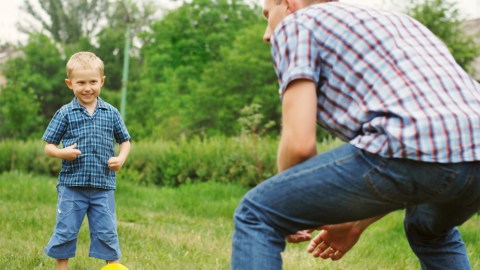Hey Psycho Sports Parents, It’s Time for an Intervention

Sports is the number one activity for American children. More than music, more than band, more than religious activities, team sports is the number one activity. And yet it’s an incredibly high source of stress. I went to Florida and watched a youth soccer tournament with ten-year-old girls. For the first game I sat with the girls. They were excited. They were rooting for their classmates. They were braiding each other’s hair. They were very involved in the camaraderie.
For the second game I went to the parent’s side. I have never seen such raw ambition and need. “Run. Hurry. Score. Pass the ball. Get in there. You’re not doing enough.” It was incredible. The children were relaxed, the parents were out of control. I went to see folks who work a lot with youth sports and had a lot of takeaways that were surprising.
There’s two great things that kids can get out of sports. On the one hand they can get all of the sports knowledge and the teamwork. The truth is that’s really the coach’s responsibility. The other issue is they can get the character. And that’s really where the parents come in.
So a couple of tips. Number one, when you go to the games, don’t use verbs. It’s incredibly hard. You can say “good shot” but you can’t say “shoot.” You can say “nice pass” but you can’t say “pass the ball.” Listen to yourself. It’s incredibly hard, but you can tell the difference. Let the coach coach, you support.
Second, on the way home, no PGA – no post game analysis. You’re not a shock jock. It’s not your job to break down, “Oh, you should have bunted at this point.” Or, “Oh, if you kept your eye on the ball you could have caught that fly.” The point is you want to talk about what they learned from the experience. Were they a good sport? Were they a good teammate? Did they have fun? Let the coach do the coaching, you worry about the values. And when I sat with these girls at this soccer tournament in Florida I said, “So if you could tell your parents one thing, what would you tell them?” They said in unison, “Shut up and cheer.”
Fifteen percent of games end up with conflict between parents and coaches, parents and children or parents and other parents. What you want sports to be is a source of bonding. So you want to start in the backyard. Throw your kid the ball. Have the kid throw the ball back. Say, “Step a little further back. Then throw it to me again.” And step a little further back. You want to have that connection so that when your child goes to the game and throws the ball or kicks the ball or whatever the sport may be, that thing which they’ve just done on the sports field, they come running to you and share because that’s the thing that you started.
So you want to have time where you play with your child. It could be sports, it could be cards, it could be bowling, it could be putt putt. It doesn’t really matter but you want to make that positive bond between you and your child so that when they’re disappointed about a loss or they get to a hard point, they know that you believe in them, and they can push through. Grit begins in the backyard between a parent and a child. A parent roots for that child, that child knows that they can push through when it gets hard.
In Their Own Words is recorded in Big Think’s studio.
Image courtesy of Shutterstock.




